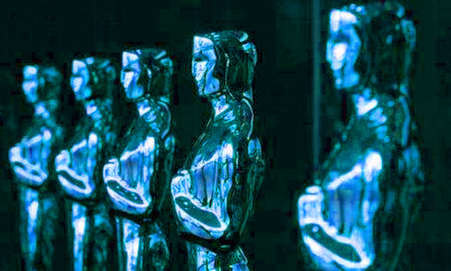The year’s most accomplished, and most important, films about war, terrorism, and geopolitics aren’t Argo and Zero Dark Thirty. They’re two modestly budgeted films from Israel and the Palestinian Territories. And, unlike their American counterparts, they’re not drawing on true stories for blockbuster entertainment. No, they are the thing itself: blistering documentaries about life and death, violence and oppression, and the struggle to remain human in unbearable conditions. 5 Broken Cameras and The Gatekeepers are morality tales, as much of a warning for gung-ho Americans of the potential costs of their military adventures as they are stark indictments of the Israeli occupation and its effects on Palestinian life.
Now, both 5 Broken Cameras and The Gatekeepers are nominees for the Academy Award for Best Documentary, to be awarded this Sunday in Los Angeles. That two of the five films nominated in this category are highly critical of Israeli security policies—and the politicians who oversee them—reflects a stark change in Hollywood’s treatment of Israeli cinema. From 1964 through 2006, only six Israeli films were nominated for Best Foreign Language Film, and none won (a film must be first submitted; being a nominee in this category is the equivalent of being a finalist). During this time, Israel had a single documentary nominated for an Academy Award—The 81st Blow, a 1974 film about the oppression of Jews in Nazi-occupied Europe.
That began to change in 2007, with the Foreign Language Film nomination of Beaufort, a tale of brotherhood and valor in the last days of Israel’s occupation of southern Lebanon. Beaufort was followed by Waltz with Bashir, a dark look at the trauma of IDF veterans who served in Lebanon and their complicity in the Sabra and Shatila massacre. (Due to the Academy’s picayune rules, Waltz with Bashir, while ostensibly an animated documentary, was submitted under the category of Best Foreign Language Film.) In 2009, Ajami, a grim story about forbidden love and clan violence in Jaffa, was also a nominee. Co-directed by a Christian Palestinian and a Jewish Israeli, the film represented a further victory for Israel’s progressive film industry.
But labeling these films as Israeli has proved problematic. In 2010, Scandar Copti, one of the directors of Ajami, strongly rejected the notion that he represented Israel: “The film technically represents Israel, but I don’t represent Israel. I cannot represent a country that does not represent me.” And more recently, Emad Burnat, the co-director of 5 Broken Cameras, objected to his film being called Israeli.
Burnat has a point. 5 Broken Cameras is almost entirely his production. He spent years filming the nonviolent protests in his village of Bil’in, where residents struggle with the encroachment of the separation barrier and the calving off of land for Israeli settlements. Burnat had some assistance from Israeli director Guy Davidi, but Burnat did the bulk of the cinematography, contributed the narration, and is the documentary’s star. It’s his story. And while the film received some government financing, Burnat isn’t an Israeli citizen; he’s a Palestinian living under Israeli military occupation. (Ajami also received some support from the Israeli government.)
The Academy doesn’t distinguish between nationalities for the documentary category, which is why two “Israeli” films can be nominated at once. But they are an important pairing—not the whole story of the occupation, but two essential pieces of it. With patience and steely determination, 5 Broken Cameras leads us through the daily humiliations of attacks from the army and settlers, night raids, the arrests of children, and the difficulty of staying nonviolent amidst an excruciating situation. We see the birth of Burnat’s son, Gibreel, and hear some of his first words: the Arabic terms for shells and soldiers.
The Gatekeepers, in turn, offers unprecedented admissions from six retired heads of Shin Bet, Israel’s internal security service, all of whom issue startling critiques of Israeli policy towards the Palestinians. “We are making the lives of millions unbearable,” says Carmi Gillon, who also relates his pain at failing to protect Prime Minister Yitzhak Rabin from a right-wing Jewish assassin. “Suddenly it becomes a kind of conveyor belt,” says Ami Ayalon, about the practice of targeted assassinations. At the end of the movie, he laments, “We win every battle, but we lose the war”—words that highlight the ultimate futility of what one former Shin Bet chief calls “tactics without strategy.” All of these men, including the iron-fisted Avraham Shalom, advocate negotiating with enemies, from Hamas to Ahmadinejad.
These films, too, represent a kind of negotiation, one that would have us move beyond antique binaries of victimhood and victory. By nominating 5 Broken Cameras and The Gatekeepers, the Academy is spurring a dialogue that started only after decades of laureled films about European Jewish survival and Israeli might. These are much different movies than Exodus, Schindler’s List, or Munich. They’re about guilt, justice, dignity, and the limits of violence; they’re about the long hangover of war and the mature demands of statehood. Kathryn Bigelow, who calls herself a “lifelong pacifist” while in the same breath praising the bravery of those prosecuting the war on terror, would do well to watch.
Previous Kvetches: The Many Sides of ‘Yossi,’ Eytan Fox’s New Film
Beyond Nepotism









